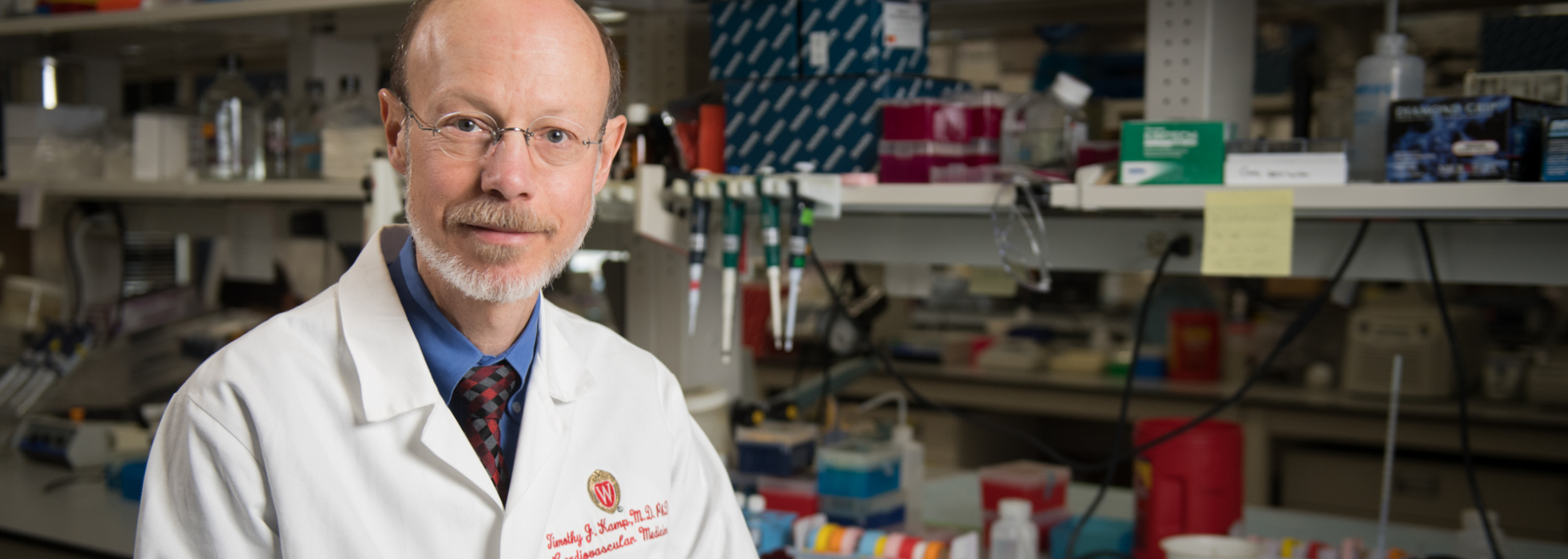Understanding Arrhythmias and Advancing Cardiac Regeneration
Timothy J. Kamp, MD, PhD, Stem Cell and Regenerative Medicine Research Professor, is a physician-scientist, an established National Institutes of Health-funded investigator, a practicing cardiologist and the director of the University of Wisconsin Stem Cell and Regenerative Medicine Center.
His research program focuses on basic mechanisms underlying arrhythmias and heart failure to innovate new therapies.

The Role of Human Pluripotent Stem Cells in Regenerative Medicine
The Kamp lab focuses on understanding basic mechanisms of arrhythmias and strategies for cardiac regeneration of the failing heart.
Human pluripotent stem cells are a central element of the research. These master stem cells can differentiate into all the major cell types present in the heart, providing unlimited quantities of human heart cells for research and therapeutic applications. The Kamp lab has pioneered this technology, developing ever-improving methods for the robust production of cardiomyocytes from human pluripotent stem cells and other cell populations such as cardiac fibroblasts.
Ongoing research examines the genetic basis of inherited arrhythmias and cardiomyopathies using a variety of approaches, including patient-specific induced pluripotent stem cells and cellular electrophysiology. Research focuses on defining the impact of genetic variants that cause abnormal rhythms and heart function at the cellular level to identify targets and pathways for therapy.
The lab is also actively pursuing strategies to re-muscularize the failing heart following myocardial infarction. Using a variety of small and large animal models in collaborative studies, we are developing and testing different cell preparations derived from human pluripotent stem cells and delivery strategies.
The research is highly collaborative and includes multiple interdisciplinary and inter-institutional projects, including the National Heart Blood and Lung Institute’s Progenitor Cell Translational Consortium (PCTC) and the Cell Manufacturing for Advanced Therapies (CMaT) Engineering Research Center.
Research Team

Scientist

Doctoral Student
Undergraduate Researchers
- Benji Gelfand
- Navid Reshadi

There are opportunities for motivated individuals in the Kamp Lab! We are seeking undergraduates, graduate students and postdocs interested in laboratory research in cardiac arrhythmias and cardiac regeneration.
If you are interested in joining the group, please send your CV and a brief description of your research experience and interests to Dr. Kamp.
Active Projects
- LRRC10 Regulation of Cardiac L-type Ca2+ Channels
Leucine rich repeat containing protein 10 (LRRC10) is a cardiac-specific protein, and genetic variants of LRRC10 have been associated with dilated cardiomyopathy. We have recently discovered that LRRC10 potently regulates L-type Ca2+ channels leading to a large increase in inward current (ICa,L). Ongoing work is investigating the mechanisms underlying LRRC10 regulation of ICa,L and how that interfaces with other regulatory pathways impacting this channel. In addition, investigating the impact of genetic variants that have been identified in patients with inherited dilated cardiomyopathy and sudden cardiac death survivors are ongoing.
- Committed Cardiac Progenitors to Remuscularize the Failing Heart
Large myocardial infarctions (MI) in the absence of prompt revascularization lead to progressive enlargement of the left ventricle, chronic heart failure and death. In this collaborative project with the Raval lab, the UW Cardiovascular Core, Fujifilm Cellular Dynamics and Cellular Logistics we are testing the intracardiac delivery of human iPSC-derived committed cardiac progenitors (CCPs) in combination with a natural cardiac fibroblast-derived extracellular matrix (cECM) to remuscularize the post-MI failing pig heart.
- Understanding Brugada Syndrome Using Second Heart Field-derived Cardiac Tissue
Brugada Syndrome is an inherited arrhythmia syndrome which leads to ventricular arrhythmias largely arising from the right ventricular outflow track. In this project we use patient-specific human iPSC cells to generate second heart field progenitors that are differentiated to right ventricular cells and second heart field fibroblast to generate a tissue model of Brugada Syndrome. Ongoing electrophysiology studies and investigations of cellular signaling are providing new insights into the pathophysiology of this disease and potential treatments.
Funding Support
Dr. Kamp's research is funded by the National Institutes of Health and National Science Foundation.
